Cultural Exchange Artist Demonstration Tent
Weekend 1
April 25 - 28, 2024
11 am - 6 pm
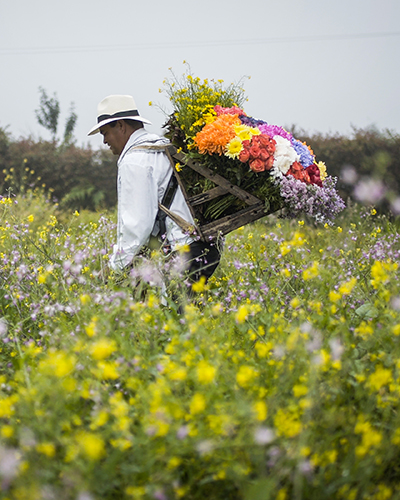
Carlos José Atehortúa, Silletero
Santa Elena, Antioquia, Colombia
Carrying heavy wooden frames with fresh flower arrangements organized in intricate designs on their backs, Santa Elena’s Silleteros are flower growers who have paraded in the Medellin Flower Festival since 1957. Carlos will demonstrate the making of a silleta with fresh flowers inside the Cultural Exchange Artist Tent. He will also join the daily Colombian parades on the first weekend of the Festival.
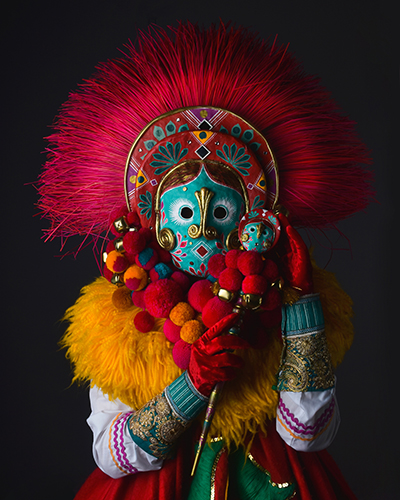
Dayra Benavides, Costume-Designer
Casa Carnaval - Pasto, Nariño, Colombia
A multi-year winner of the Blacks and Whites Carnival individual costume contest, Dayra Benavides comes from Pasto, a town located in the Andes Mountains of Southwestern Colombia, which is home to diverse ethnic and religious customs. Dayra designs whimsical carnival costumes, blending pre-Columbian and colonial imagery with mythical characters. She will present her colorful collection of “Joyas Blandas” or “soft jewelry” inside the Cultural Exchange Artist Demonstration Tent on first weekend, and will appear on stage in full regalia with Lucio Feuillet on May 4 & 5.
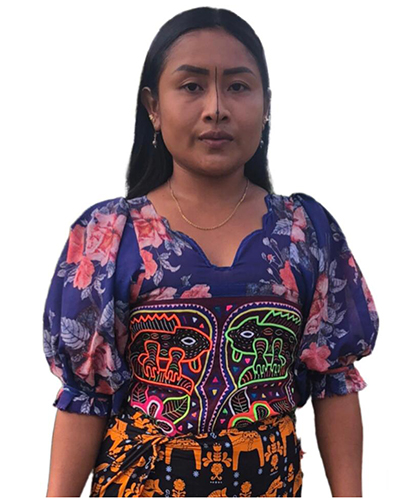
Florita Chambes Arteaga, Gunadule Mola Artisan
Necoclì, Antioquia, Colombia
Molas are colorful hand-sewn cotton textiles traditionally fashioned into blouses and worn by the Guna women of Colombia and Panama as symbols of protection and representation. Florita Chambes is a master sewer from the Gunadule community of Necoclí, on the eastern shore of the Gulf of Urabá across from Panama.
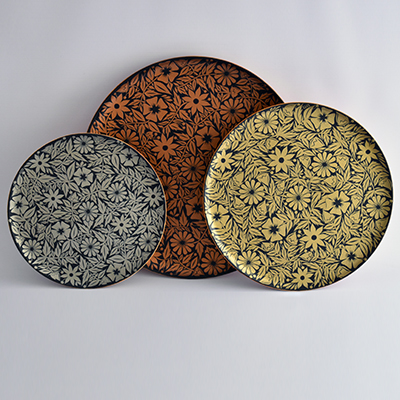
Oscar O. Granja Peña, Mopa Mopa Varnish
Taller Granja/Barniz de Pasto - Pasto, Nariño, Colombia
Oscar Granja is a master in the Mopa Mopa varnish, an ancestral technique found in the region of Pasto, in the Andes Mountains in the Southwest of Colombia, near the border with Ecuador. The buds of the leaves of the Mopa-Mopa tree are transformed into thin sheets of different colors, which are then applied to objects, mainly wood, and cut with a scalpel, forming intricate designs.
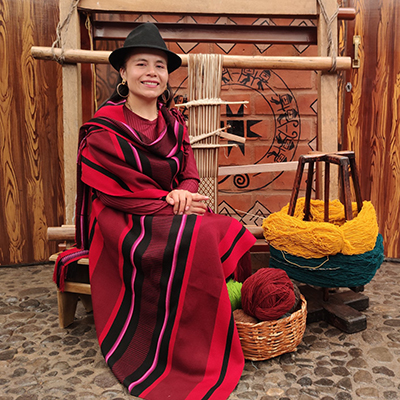
Flor Imbacuan Pantoja, Fashion Designer
Hajsú Etnomoda - Carlosama, Nariño, Colombia
Flor Imbacuan Pantoja is the creative director of Hajsú Etnomoda. She takes pride in merging the ancestral weaving tradition of the Pastos ethnic group in Nariño, Colombia, with contemporary fashion designs. Hajsú Etnomoda offers a wide range of clothing items, including shawls, coats, traditional skirts, vests, capes, and blankets.
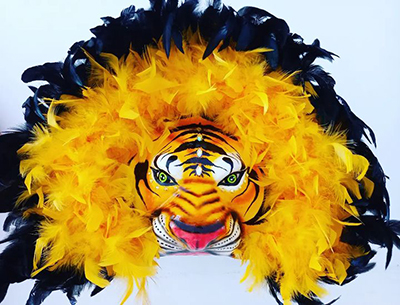
Manuel Pertuz Mendoza, Mask-Maker
Toro Miura - Galapa, Atlántico, Colombia
Manuel Pertuz Mendoza is a master craftsman who has dedicated his life to the preservation and promotion of the Carnival of Barranquilla, on the northern Caribbean coast of Colombia. He carves and paints the colorful animal wooden masks associated with the Carnival of Barranquilla.
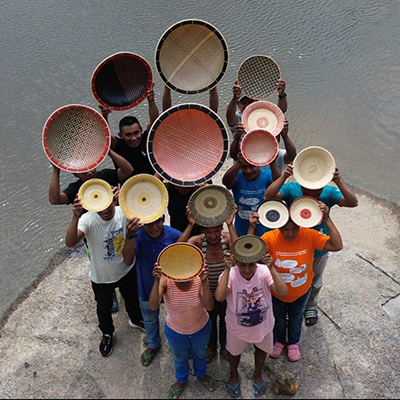
Cristian Rodríguez, Cubeo Yurêmakū Basket Weaver
Avimak - Mitú, Vaupés, Colombia
Cristian Rodríguez Uribe is a 25-year-old artisan from Mitú, a remote community in the depth of the Amazon Forest, next to the border with Brazil. Cristian uses his community’s ancestral weaving techniques to create unique baskets, incorporating Cubeo symbols that grant meaning and cultural value to each piece. Cristian brings his new collection of “balay,” or large woven plates inspired by indigenous utensils that depict autochthonous figures of the indigenous culture of Vaupés.
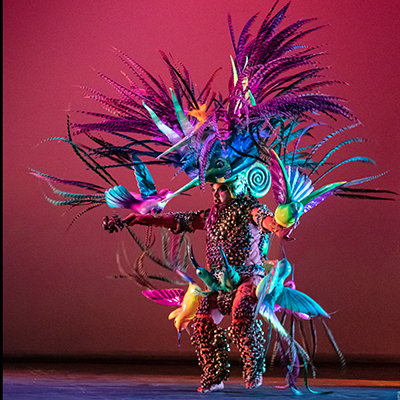
Gerado Rosero, Scenic Artist
Teatro Danza Pies del Sol - Bogotá, Cundinamarca, Colombia
Luis Gerardo Rosero presents a sample of the colorful costumes he designs and performs with in the Black and White Carnival of Pasto, and in the Multicolor Carnival of the Border in Ipiales, where he appears annually.
Cultural Exchange Artist Demonstration Tent
Weekend 2
May 2 - 5, 2024
11 am - 6 pm
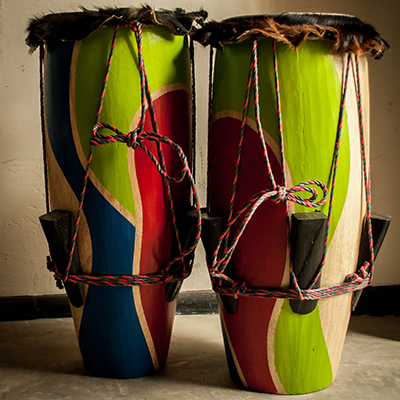
Addo Obed Possu Dinas, Marimba-Maker
Fundación Katanga - Cali, Valle del Cauca, Colombia
A recognized musician and master craftsman, Addo Obed builds drums and marimbas used in the traditional music of the Pacific Coast of Colombia. He founded the Katanga Foundation in Cali, Colombia whose mission is to rescue, preserve, and spread Afro-Colombian traditional music and culture.
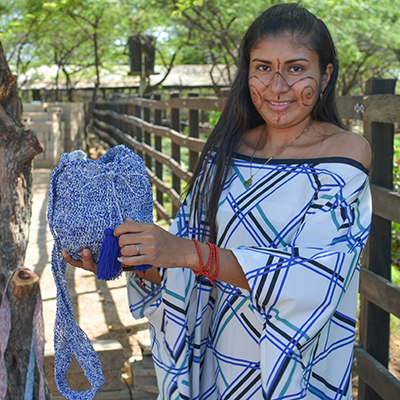
Aleide Tile Uriana, Wayuú Weaver
Kattoui - Uribia, La Guajira, Colombia
Aleide Tile is widely recognized throughout the northern peninsula of La Guajira, Colombia as an important ambassador for Wayuú culture, particularly in the field of weaving. In the Wayuú territory of the Waimpiralein Uribia Jalala, region of the Guajira, Aleide and her community innovated to address the plastic waste plaguing their territory, mixing recycled plastic with the natural fibers used to weave the traditional shoulder bags their community is recognized for.
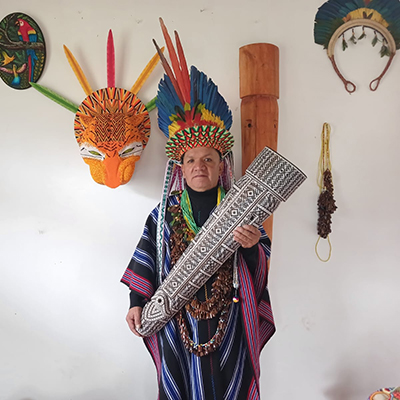
Ángel Marino Jacanamejoy, Kamënts̈á BiyáKamëntsá Wood-Carver
Artejacam - Indigenous Reserve of the Kamënts̈á Biyá People, Sibundoy, Putumayo, Colombia
Angel Marino Jacanamejoy began his career reviving traditional wooden Tsenës benches and specializing in ceremonial masks for the traditional Bëtsknaté festival or Carnival of Forgiveness. He captures the faces of Kamënts̈á Biyá men and women in his ceremonial masks, reflecting their daily lives, traditions, and customs in his art.
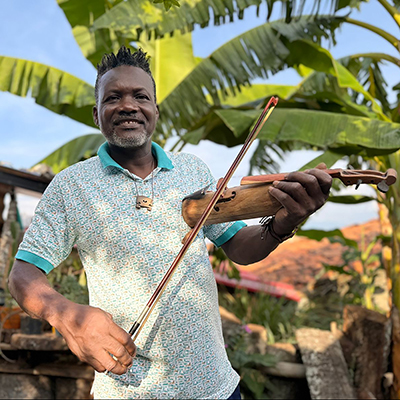
Deryam Popó Amú, Violin - Maker
Violines Caucanos - Santander de Quilichao, Valle del Cauca, Colombia
With over 38 years of experience, Deryam has contributed to keeping alive the tradition of the Cauca violin. Made with guadua bamboo, the instrument is unique to the Afro-Colombian folk music played in the Cauca area of Colombia.
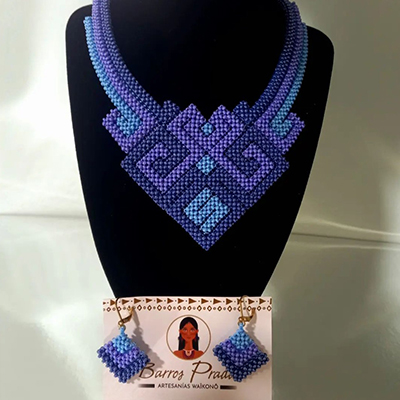
Edwar Acuña Barros, Puratapuyo Jewelry-Maker
Barros Prada - Mitú, Vaupés, Colombia
Edwar belongs to the Puratapuyo ethnic goup, one of the 27 indigenous communities coexisting in the vast national reserve in the Vaupés region of the Amazon. Edwar is dedicated to preserving and promoting the diverse cultures of his territory through his jewelry. His stunningly beautiful pieces convey a symbology preserved by generations of indigenous families that represent their worldviews.
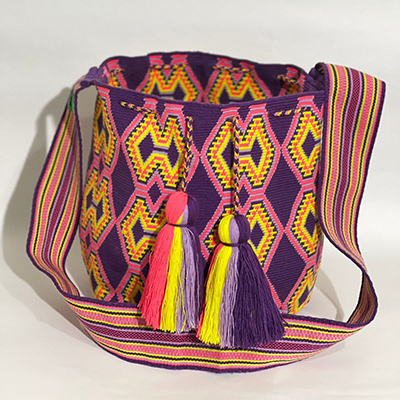
Jarara Tamaiwa Barros, Wayuú Weaver
Kanaspi - Riohacha, Guajira, Colombia
Jarara is a master artisan and community leader from the ancestral territory of Wayuú Pariyen. She founded the Kanaspi Artisan Association, composed of over 200 artisans from the northern peninsula of La Guajira. The goal of the association is to improve living conditions for the Wayuú people by strengthening their culture and language, and by preserving the symbolism of their art. Jarara brings this symbolism to life with the bags, hammocks, and traditional clothing she and her community create.
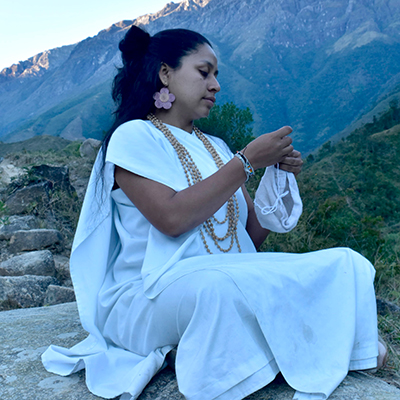
Liliana Villazon Arias, Kankuama Weaver
Asoarka - Atanquez, Cesar, Colombia
Liliana employs the technique of blunt needle and knotting, creating shoulder bags, hammocks, table centerpieces, and jewelry with cheerful colors and mystical designs. She represents Asoarka, a non-profit organization with 300 members dedicated to strengthening the artisanal and socio-cultural fabric of the Kankuamo People of the Sierra Nevada Gonawindúa.
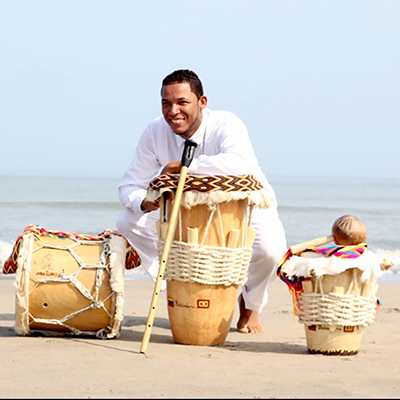
Waidis Ortega Miranda, Drum-Maker
Batámbora - Cartagena, Bolívar, Colombia
Waidis is a young entrepreneur from the Afro-Colombian beach community of La Boquilla, in Cartagena. He is committed to preserving the cultural traditions of his African heritage through drum-making and through the teaching of percussion. He will perform with Batámbora – a drum and dance troupe parading at the Festival on second weekend.
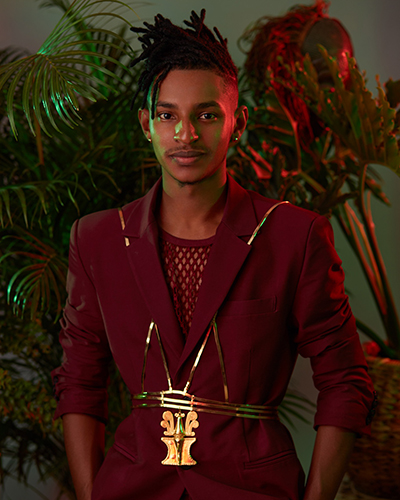
Esteban Sinisterra Paz, Fashion Designer
Esteban African - Cali, Valle de Cauca, Colombia
Esteban is a talented 23 year-old Afro-Colombian Fashion Designer who rose to fame by designing the garments worn by Colombian Vice President Francia Márquez. Born in Santa Bárbara de Iscuandé, Esteban was displaced by violence at the age of six. After relocating to Buenaventura, he started designing and making clothe to help support his family. Esteban African is a brand inspired by the aesthetics of the African diaspora. His “resistance fashion” celebrates the contribution of the Afro-descendants of the Pacific coast of Colombia to the regional and national identity.
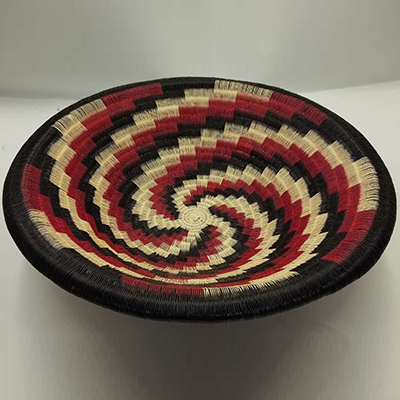
Aldo Chamarra Chirimia, Wounaan Weaver
Artesanía Renacer - Buenaventura, Valle del Cauca, Colombia
This presentation was made possible with the support of USAID and ACDI/VOCA’s Indigenous Peoples and Afro-Colombian Empowerment Activity, better known as Juntanza Étnica, which continues the long-standing partnership with indigenous and Afro-Colombian communities in Colombia. Juntanza Étnica contributes to the self-determined development of ethnic communities by strengthening the institutional and advocacy capacity of ethnic organizations, and contributes to the increased participation of communities in the implementation of peace. It promotes respect for cultural heritage and diversity and supports the development of environmentally sustainable socioeconomic opportunities. It is implemented in the Caribbean, Pacific and Amazon regions of Colombia, as well as in Bogotá.




